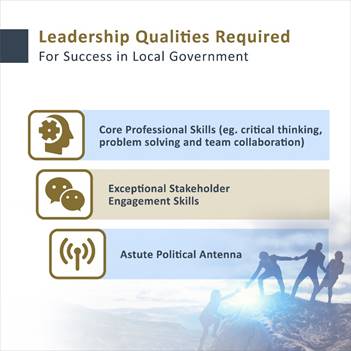

Local government is the important third layer of government in Australia. Kym Fletcher explores the key senior leadership hiring trends and traits required for occupational success.
Local government in Australia employs 191,000 people in almost 400 occupations across 537 Councils, with each Council overseen by a governing body of councillors and a mayor. Fifty-five per cent of Australia’s Councils are in regional and remote areas, and can vary greatly in size, from as small as 1.5 square kilometres, to as big as 380,000 square kilometres – which covers a geographical area larger than Egypt or Pakistan.
Amalgamation
In a bid for greater efficiency and to reduce operational costs through economies of scale, many local government entities (Councils) have undergone forced amalgamation in recent decades in different Australian states and territories, most recently in NSW. Local government in Victoria also went through a large consolidation process throughout the 1990s, where 210 shires were reduced to just 78.
As a result, amalgamated local government entities are increasingly large and complex organisations. These Councils serve an extremely wide variety of constituents (ethnically, socio-politically and demographically), and have also increased the range of services they offer. This presents new organisational leadership challenges with regards to prioritisation of funding, operational execution, inclusive governance, organisational agility, digitisation, and project management.
Executive talent
Accordingly, Councils need to attract top executive talent with particular skillsets to help steer these larger and more diverse organisations into the next chapter. Fortunately, there has also been an increase in the sophistication of their hiring departments, so they are increasingly in a position to do so.

Leadership qualities
Currently, the qualities needed in modern senior executives in local government include:
- Deep experience and proficiency in a wide range of core professional skills, most importantly critical thinking, problem solving and team collaboration
- Exceptional stakeholder engagement skills in order to effectively meet the needs of a diverse range of grassroots stakeholders that are much ‘closer to the ground’ than in other sectors, including other levels of government
- Astute political antenna and the ability to develop effective working relationships with the elected Councillors who, again, are close to the ground and can access senior executives at any time with issues and requests.
Search for talent
Whilst Council CEOs/General Managers and hiring departments are always keen to encounter executives with deep experience in local government, they are also searching for talent from an ever-widening variety of sources. There is an increased level of movement between the private sector and local government, although the adjustment to public sector environments for corporate individuals can be a little challenging, due to the different kind of authorising structures and the political layer above the executive.
State government entities are another obvious talent pool for sourcing top leaders and executives, and there is currently much more porosity between these two levels of government.
Many state government executives regard local government as a genuine alternative place of employment, particularly for those who see roles in Councils as an opportunity to contribute to communities more directly, and potentially more impactfully, at a micro level. State government appointees to senior local government roles often enjoy the different challenges and level of complexity that occurs at the local government level.
Australian local government entities are increasingly complex organisations that need ever-more capable leaders and executives. Success in the sector requires a unique mix of political mettle, dexterity and application. Councils are increasingly sourcing and recruiting talented individuals from a wide range of backgrounds and sectors, and this is having a positive impact on the ability of Councils to meet the varied and complex needs of their communities.
Kym Fletcher is a Partner at NGS Global with expertise in the public sector, having held senior roles in NSW state government including Director Regulation and Audit with the EPA.
Comment below to have your say on this story.
If you have a news story or tip-off, get in touch at editorial@governmentnews.com.au.
Sign up to the Government News newsletter